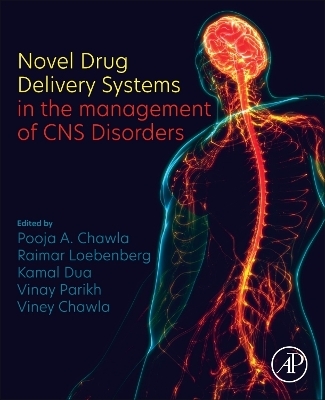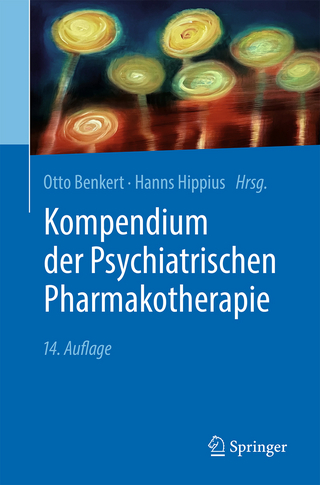
Novel Drug Delivery Systems in the management of CNS Disorders
Academic Press Inc (Verlag)
978-0-443-13474-6 (ISBN)
Dr. Pooja A Chawla is working as a Professor, at the University Institute of Pharmaceutical Sciences, Baba Farid University of Health Sciences, Faridkot, Punjab, India. She has 22 years of experience in the research, discovery, and development of biologically active pharmaceuticals. Dr. Chawla holds a PhD degree in Pharmaceutical Sciences with a specialization in Pharmaceutical Chemistry and has published 6 books, 25 book chapters, and more than 150 papers in national/international journals and is serving as a reviewer for international journals of repute. Dr. Pooja is also privileged to serve as guest editor of two reputed journals CNS & Neurological Disorders - Drug Targets IF 2.8 and Current Organic Chemistry IF 2.5) of Bentham Sciences. She has been appointed as Academic editor of PLOS ONE journal IF 3.2 and recently she has been appointed as Assistant editor for Health Sciences Review Journal by Elsevier publishers. She has guided more than 60 postgraduate projects and her research team consists of 6 Masters and 4 Doctoral research scholars. Her area of research interest focuses on the design and synthesis of various heterocyclic moieties including 4-Thiazolidinones, 2,4-Thiazolidiedione, Coumarin, Pyrazolines, Schiff’s base derivatives to name a few for the discovery of medicinally important agents as anticonvulsants, antidepressants, anticancer, anti Alzheimer’s agents. She is well-versed with method development and validation and guiding research scholars in this field. Prof Raimar Löbenberg holds a BS in Pharmacy from the Johannes Gutenberg-University, Germany. He received his PhD in Pharmaceutics from the Johann Wolfgang Goethe-University in Frankfurt in 1996 for his work on drug delivery using nanoparticles. He joined the University of Alberta in 2000, where he is now a Professor in Pharmaceutical Sciences. His research interests are inhalable nanoparticles to treat lung diseases such as lung cancer and tuberculosis. His lab regularly develops and characterises nanoparticles for various inflammatory diseases and cancer. His lab also hosts a unique pencentury device which assists in effectively delivering nanoparticles to the lungs of rodents. He holds a US patent for the delivery of nanoparticles to the lungs. Another major interest area is Biopharmaceutics, and predicting the oral performance of drugs and botanicals. Prof Löbenberg is a founder and Director of the Drug Development and Innovation Centre at the University of Alberta. The Centre specialises in clinical trial material production, and holds a Health Canada site licence and a drug establishment licence. The Centre has controlled substance licences to synthesise psychedelics in a dedicated chemistry lab. The quality control lab has state-of-the-art analytical instruments and other pharmaceutically relevant performance test instruments. Prof Löbenberg is a former president of the Canadian Society for Pharmaceutical Sciences (2014-2015). He is a member and Vice Chair of the United States Pharmacopeia Dietary Supplement Expert Committee, a Vice Chair of the Specialty Committee of Traditional Chinese Medicine in Pharmaceutics of the World Foundation of Chinese Medicine Science, and a member of the Health Canada Scientific Advisory Committee on Pharmaceutical Sciences and Clinical Pharmacology, and of the Health Canada Scientific Advisory Committee on Opiate Abuse. Dr. Kamal Dua is an Associate Professor in the Discipline of Pharmacy at the Graduate School of Health, University of Technology Sydney (UTS), Australia. He has research experience of over 13 years in the field of drug delivery systems targeting inflammatory diseases. Dr. Dua is also a Node Leader of Drug Delivery Research in the Centre for Inflammation at Centenary Institute/UTS, where the targets identified from the research projects are pursued to develop novel formulations as the first step towards translation into clinics. Dr. Dua research in two complementary areas; drug delivery and immunology, specifically addressing how these disciplines can advance one another, helping the community to live longer and healthier. This is evidenced by his extensive publication record in reputed journals. Dr. Dua’s research interests focus on harnessing the pharmaceutical potential of modulating critical regulators such as Interleukins and microRNAs and developing new and effective drug delivery formulations for the management of chronic airway diseases. He has published more than 100 research articles in peer-reviewed international journals and authored or co-authored four books. He is an active member of many national and international professional societies. Vinay Parikh is an Associate Professor in the Department of Psychology at Temple University (Philadelphia). He also serves as the Director of Neuroscience Program in Temple’s College of Liberal Arts and provides strategic leadership, direction, and guidance for all educational and professional activities in the program. Dr. Parikh has successfully directed multiple research projects, resulting in notable contributions to the understanding of neural mechanisms underlying cognitive decline in age-related neurodegenerative and psychiatric disorders. His research has also opened new avenues to develop cognition therapies. Dr. Parikh has published more than 90 scientific articles and book chapters in areas of systems and behavioral neuroscience, biological psychiatry, and pharmacology, and serves on several editorial boards of journals. He also regularly serves on scientific advisory and review committees of numerous biomedical research agencies including the National Institute of Health, Alzheimer’s Association, and Michael J Fox Foundation. Dr. Viney Chawla is working as Professor and Principal at University Institute of Pharmaceutical Sciences and Research, Baba Farid University of Health Sciences, Punjab, India, He has 25 Years of experience in the research, formulation and development of solid lipid nanoparticles, microspheres, nanostructured lipid carriers. Dr. Chawla holds a Ph D Degree in Pharmaceutics and has Published 3 Books, 30 Book Chapters and more than 100 Papers in National/International Journals and is serving as a Reviewer for International Journals of repute. He has guided 40 Post Graduate Projects and his research team consists of 9 Masters and 4 Doctoral Research Scholars.
Part I – Introduction to Drug delivery to the CNS
1. General physiology and function of brain
Anoop Kumar I
2. Drug Delivery to Brain: Formulation Challenges and Potential Approaches
Ashish Baldi, Manisha Kumari and Akshay Kumar
3. Possible targets in the management of various CNS disorders
Viney Chawla, Pooja A. Chawla, Ankur Kumar and Bhupender Nehra
4. Antioxidants and their possible benefits in neurodegeneration
Pooja A. Chawla, Viney Chawla, Keshav Taruneshwar Jha and Gouranga Sundar Roy
5. Prodrug approaches for delivering CNS active agents
Pooja A. Chawla, Viney Chawla, Nikita Sharma and Debashree Debashish Das
6. Traditional practices in CNS drug delivery
R K Narang and Pooja A. Chawla
7. Emerging need of Novel Drug Delivery Systems in management of CNS disorders
Viney Chawla, Pooja A. Chawla, Neha Jain, Manisha Pandey, Ms Triveni and Aditi Sinha
8. Nose to brain drug delivery through advanced Drug Delivery Systems
Monica Gulati
9. PBPK modeling for CNS Delivery
NAGENDRA SINGH CHAUHAN
Part II – Novel Drug Delivery Systems to specific CNS Disorders
10. Superparamagnetic Iron Oxide Nanoparticles and their Potential Role in the Diagnosis and Therapeutics of Various Neurological Disorders
Bhupinder Singh Bhoop, Anjali Pant, Gurpal Singh, Ravi Pratap Barnwal, Sumant Saini and Atul Jain
11. Novel Drug Delivery Systems in treating epilepsy
REYAZ HASSAN, Jasreen Uppal and Apporva Chawla
12. Novel Drug Delivery Systems in the management of Parkinson’s Disease
Vimal Arora
13. Role of Novel Drug Delivery Systems in managing Alzheimer’s Disease
Viney Chawla, Pooja A. Chawla, Ankur Kumar, Bhupender Nehra, Ms Chahat and Abhimannu Shome
14. Novel Drug Delivery Systems in the management of Huntington’s Disease
Monica Gulati
15. Novel Drug Delivery Systems in the management of multiple sclerosis
Dileep Kumar and Gadde Shareena
16. Role of Novel Drug Delivery Systems in delivering antidepressant drugs to the brain
Pooja A. Chawla, Dilpreet Singh, Viney Chawla, Kamal Dua, Amrinder Singh, Ms Amisha and Namandeep Raj
17. Delivering cancer chemotherapeutics to the brain through Novel Drug Delivery Systems
Pooja A. Chawla
18. Novel Drug Delivery Systems in the management of Schizophrenia
Dileep Kumar and Gadde Shareena
19. Prospects of Novel Drug Delivery Systems in treating cerebral palsy
Molakpogu Ravindra Babu, Sukriti Vishwas, Monica Gulati, Kamal Dua, Sachin Kumar Singh, Prathap Madeswara Gupta and Palakurthi Yanadaiah
20. Novel Treatment in Managing Autism
Yadu Nandan Dey, Dharmendra Kumar, Manju Singh and Deependra Singh
21. Novel Drug Delivery Systems in amyotrophic lateral sclerosis
Devidas S. Bhagat, Pooja A. Chawla, Gurvinder S. Bumbrah, Dattatraya Pansare, Bapu R Thorat and Digambar D Gaikwad
22. Novel Drug Delivery Systems in cerebral vascular disorders, transient ischaemic attack and stroke interventions
Dharmendra Kumar, Deependra Singh and Manju Singh
23. Treating meningitis through Novel Drug Delivery Systems
NAGENDRA SINGH CHAUHAN
24. Treatment of CNS infections in AIDS positive patients through Novel Drug Delivery Systems
SS Pancholi, Alok Shiomurti Tripathi and Partha Saha
25. Novel Drug Delivery Systems in the management of myasthenia gravis
Dharmendra Kumar
26. Etiology and Treatment Challenges for Neurotraumatic and Psychiatric Disorders
Mohd. Farooq Shaikh and Alina Arulsamy
27. Trends in delivery of drugs to brain for treatment of neuropathy
Sukhbir Singh, Neelam Sharma, Ishrat Zahoor and Sandeep Arora
28. Delivery of antimigraine drugs to brain through Novel Drug Delivery Systems
Manisha Pandey
29. Treatment of heavy metal induced neurotoxicity via advanced drug delivery systems
Arun Kumar, Mr Abhinav, Mahesh Rachamalla, Mohammad Ali, Sneha Navin, DHRUV KUMAR and Ashok Kumar Ghosh
Part III – Clinical Trials and Future Prospects
30. Exploring the potential of artificial intelligence in drug delivery to brain
Vimal Arora
31. Advanced Drug Delivery Systems in the Management of CNS Disorders
Shamsher Singh, Pooja A. Chawla, Md Reyaz Alam and Anjalee Bhratee
32. Future prospects and Challenges to CNS drug delivery
Sushama Talegaonkar Sr. and Monalisa Mishra
| Erscheinungsdatum | 28.09.2024 |
|---|---|
| Verlagsort | San Diego |
| Sprache | englisch |
| Maße | 216 x 276 mm |
| Gewicht | 450 g |
| Themenwelt | Medizin / Pharmazie ► Medizinische Fachgebiete ► Pharmakologie / Pharmakotherapie |
| Medizin / Pharmazie ► Pharmazie | |
| Technik | |
| ISBN-10 | 0-443-13474-X / 044313474X |
| ISBN-13 | 978-0-443-13474-6 / 9780443134746 |
| Zustand | Neuware |
| Informationen gemäß Produktsicherheitsverordnung (GPSR) | |
| Haben Sie eine Frage zum Produkt? |
aus dem Bereich


